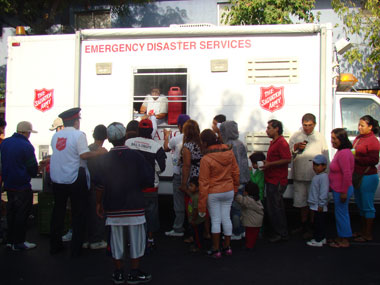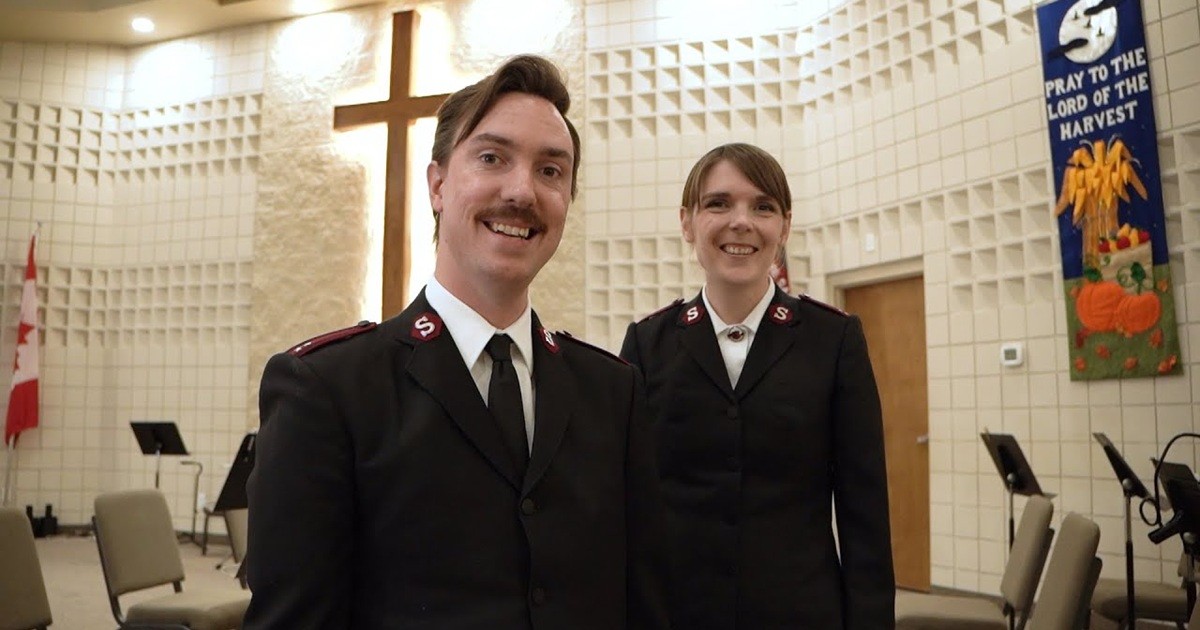 The Salvation Army in southern Chile is combining its resources and using careful planning to help people affected by the earthquake and tsunami that caused devastation to much of the country, particularly in and around the city of Concepcion.
The Salvation Army in southern Chile is combining its resources and using careful planning to help people affected by the earthquake and tsunami that caused devastation to much of the country, particularly in and around the city of Concepcion.
The emergency disaster headquarters for the southern region has been established at the Salvation Army corps (church) in Hualpencillo, which is located between Concepcion and the coast. The corps has a kitchen where meals can be prepared. There are tents set up at the corps, some occupied by Salvation Army soldiers (members) from Hualpencillo whose homes were washed away by the tsunami caused by the earthquake.
An emergency disaster team arrived on Monday 1 March from Valdivia with goods and resources that could be distributed in the most affected areas. Vans and other Salvation Army emergency vehicles are delivering meals and other essentials. Local Salvationists are being supported by an emergency disaster services team of officers and soldiers from Osorno, 250 kilometres south of Hualpencillo.

 More than five years ago Major Juan Gutierrez, then corps officer (Salvation Army minister) at Hualpencillo, dug a well with which to water the lawns and gardens around the Salvation Army property. He never used it but God has honoured his plans by making the well an important component of The Salvation Army's response to the earthquake.
More than five years ago Major Juan Gutierrez, then corps officer (Salvation Army minister) at Hualpencillo, dug a well with which to water the lawns and gardens around the Salvation Army property. He never used it but God has honoured his plans by making the well an important component of The Salvation Army's response to the earthquake.
The current corps officer, Major Abraham Marin, installed a pump on Wednesday (3 March) and, using a generator supplied by Major Roberto Moya, corps officer at Osorno, there is now a source of clean water which can be used by the people being helped by The Salvation Army in Hualpencillo.
Major Juan Carlos Alarcon, Divisional Commander of The Salvation Army's Chile South Division, says: 'I spoke with Major Gutierrez by telephone to advise him that members of his family who live in the [earthquake] zone are safe. At the same time, I thanked him for drilling the well, which is now helping hundreds of families. In Hualpencillo, we are not only providing food, but fresh spring water as well.'
On Tuesday the corps officers from Concepcion and Hualpencillo, Majors Carlos and Elizabeth Aguilar and Majors Abraham and Norma Marin, met with corps members to decide the type of help they should give to people affected by the earthquake. Representatives from the regional government, army, navy and other religious and non-government organisations (NGOs) attended the meeting.
The two corps have been officially recognised and lines of communication have been established to help provide immediate assistance and support during the eventual reconstruction.
The Chilean capital, Santiago, was not affected as badly as the southern cities but the earthquake still caused damage there. In the Brazil neighbourhood, 1,500-2,000 people are being served with food every day. Hot meals and substantial breakfasts are now being offered, along with supplies of water, first aid essentials, blankets and candles.
Major Nancy Alarcon, officially on sick leave while recovering from surgery, has taken charge of the many missing persons enquiries arriving at The Salvation Army's Chile South Divisional Headquarters through the Internet, by telephone, in letters and on handwritten notes. On Wednesday Nancy and her team were able to respond to Europe regarding a person who was found to be safe in a rural village. This means of assistance will continue to be expanded.
'Let's Help Hualpen' is the slogan that Captain Marcos Gutierrez, corps officer in Ancud on the island of Chiloe in southern Chile, is promoting in his area on radio and television. He has received 60 bags of merchandise, clothing, 200 litres of water, 50 boxes of milk, pasta, rice, sacks of potatoes, disposable adult diapers, crockery, blankets, bedspreads and sheets – all donated by the neighbours around the corps.
A municipal truck has been put at his disposal to take the items from Ancud to Hualpencillo, and he will be accompanied on the journey by a local radio personality and reporter from Ancud.
Major Juan Carlos Alarcon concludes: 'We are glad to report that our officers have freedom of movement during the curfews. Caravans are being coordinated to bring supplies in safely. We are part of the group of recognised agencies for the administration of assistance from the Government in the assigned zones.'









Comment
On Wednesday, March 17, 2010, Pauline Hylton said:
Leave a Comment